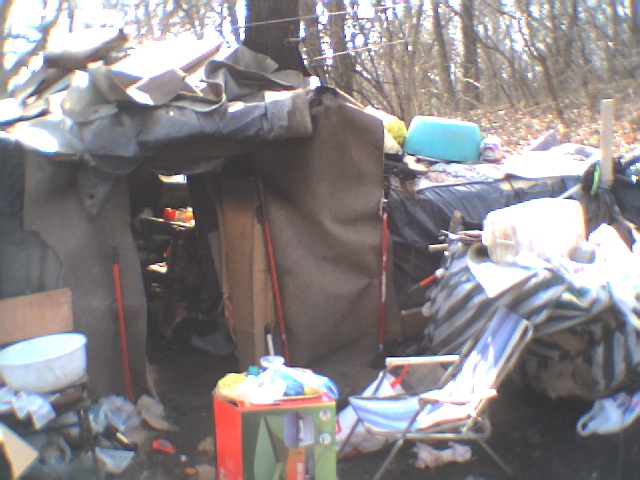 No matter what a person's personal feelings may be on homelessness - its causes, its effects, what our public policies should be with regard to - at this time of year a sense of decency overcomes the coldest perspective. Even those of us who see homelessness, in the big picture, as a social ill that inhabits the individual, not an individual for whom an ill society has failed, even our hearts thaw paradoxically when the temperatures drop below freezing. The befuddling landscape of Seattle politics and activism provide us with a way to laugh and maintain our objectivity.
No matter what a person's personal feelings may be on homelessness - its causes, its effects, what our public policies should be with regard to - at this time of year a sense of decency overcomes the coldest perspective. Even those of us who see homelessness, in the big picture, as a social ill that inhabits the individual, not an individual for whom an ill society has failed, even our hearts thaw paradoxically when the temperatures drop below freezing. The befuddling landscape of Seattle politics and activism provide us with a way to laugh and maintain our objectivity.
As city-run and privately-operated emergency shelters open to give warmth to as many of our city's homeless as possible, the homeless themselves are organizing a protect outside of City Hall. From KOMO television's Bryan Johnson:
Emergency shelters at City Hall, the Seattle Center and the Frye Hotel will remain open to help the homeless, according to the Mayor's Office. So far 471 people have been helped, but the homeless say that's just not good enough.
The homeless have set up tents outside City Hall to protest the city sweeps through homeless camps. They want to deliver a message: there are thousands who need help.
Of course, the protest is just a continuation of what has been dubbed 'Nickelsville' by many, an nomadic 'tent-in' demonstration to protest what many homeless and homeless activists see as Mayor Greg Nickels' failure to cure Seattle's homeless problem. The Seattle Times' illuminates:
Nobody is expected to be turned away from indoor shelter, said Maj. Myles Plummer, director of the Salvation Army's William Booth Center that houses homeless men.
The agency provided shelter Sunday night for some 300 of the homeless.
If more of the homeless arrive during the freezing weather, said Plummer, "you close the gaps. Where you might have a 6-inch gap between you and the next guy, now everybody gets closer."
At Nickelsville, residents said they liked the freer life, even if it means putting tents on top of wooden pallets so they don't sleep right on top of a cold, paved surface.
So, in Seattle, the community rallies to provide shelter when most needed but the homeless choose their path. This has, and always will be, the reason that many of us will never jump on board spending large amounts of money on programs to benefit the homeless until those programs include money for psychological diagnosis and treatment. There is nothing dignified about refusing help and placing yourself in peril. When one has demonstrated that one's own survival is forfeit to preserving the delusion of independence, such a person has crossed the line into insanity and we must deal appropriately with that malady.
Dozens may die needlessly in this stretch of frigid weather. If we would only get serious about dealing with this problem as what it is - the manifestation of mental illness, in many cases - many of those lives might be spared.
###






I think you're right, except that the local papers did a pretty good job this year of highlighting the failures of the Seattle mental health system, which is full of holes and lacks funding to deal with the problem. As a conservative, would you favor funding that would provide counseling and mental health facilities for homeless people with mental illness?
ReplyDeleteLisa,
ReplyDeleteI would absolutely favor funding for those areas. I think one of the major mistakes of President Reagan's administration was the eliminating federal funding that once provided a means of taking people off the streets who had ceased to be able to care for themselves. In some cases, the mental illnesses suffered by some of our current homeless might never be cured, but for society not to intercede is inhumane. If the truly ill - and I include those who suffer from substance abuse problems (which seem to grow out of severe emotional and psychological problems) - are off the street, it makes the process of dealing with those remaining - those economically disaffected - more manageable. As it stands, the organizations that do their best to serve the homeless could not possibly be expected to do so adequately; the needs of the homeless are too severe and complex to be met by food and shelter, too costly to be paid for by organizations who themselves exist on the shekels tossed their way by generous donors, sometimes supplemented by government grants.
Bryan